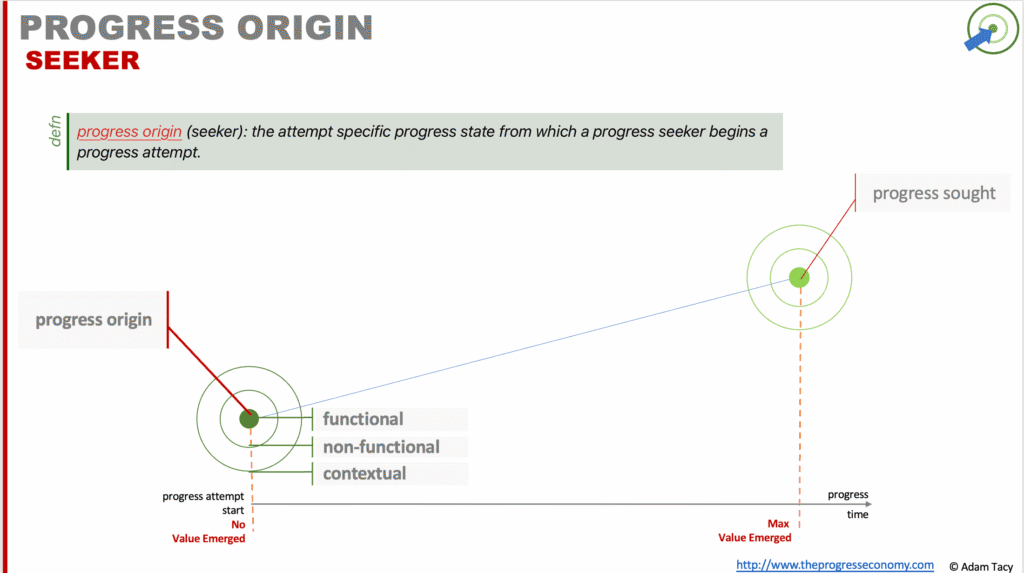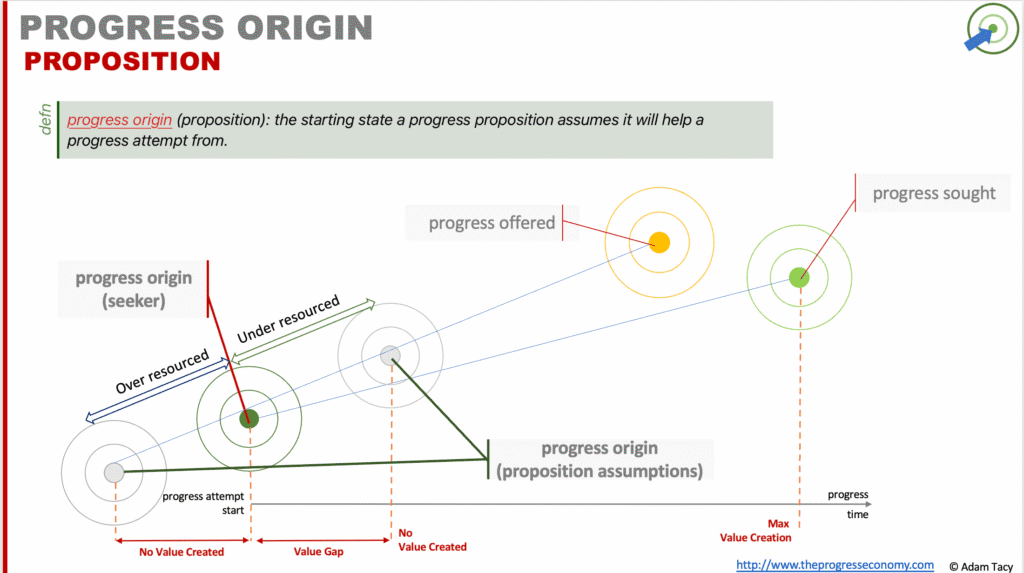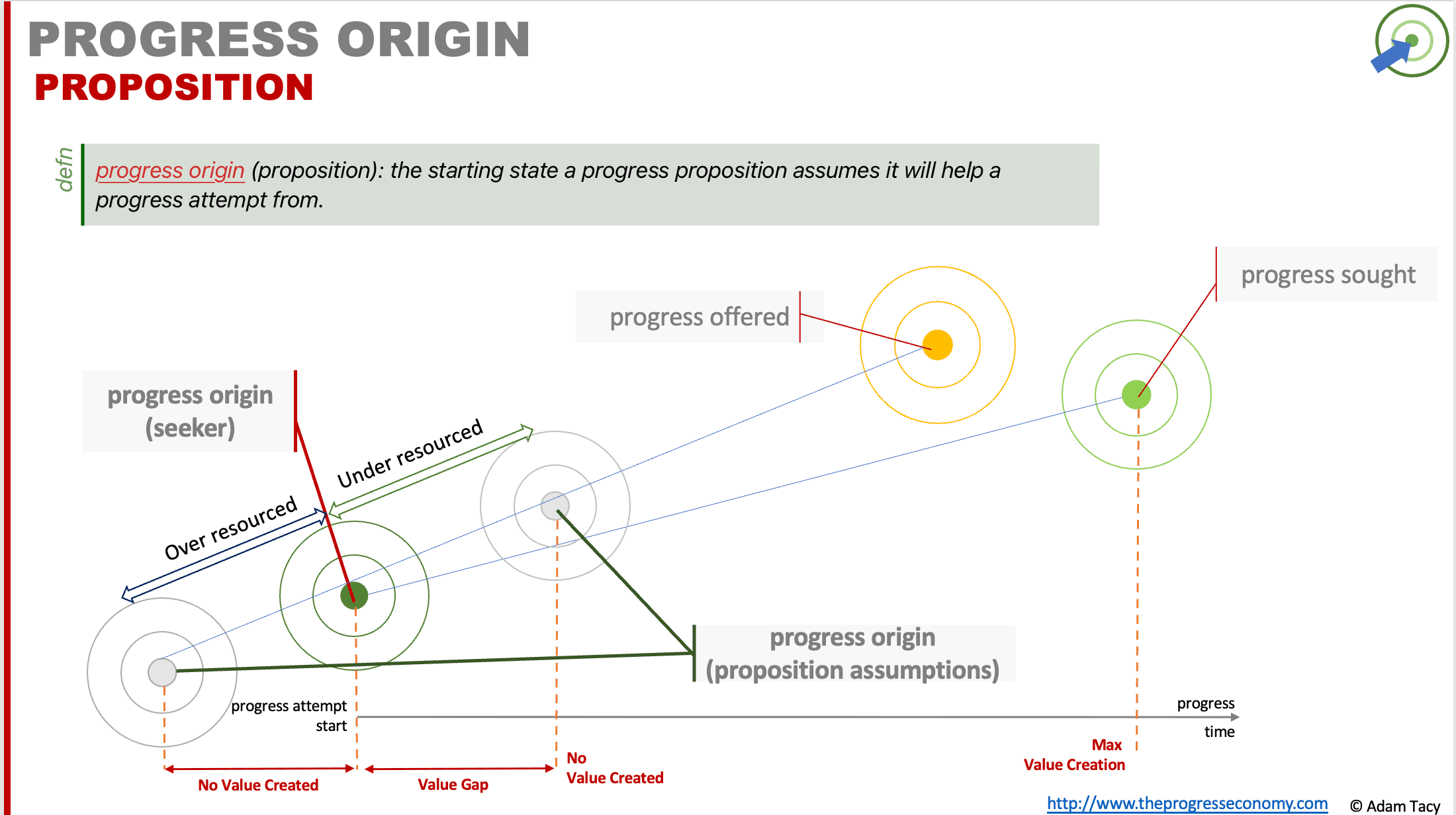What we’re thinking
Progress origin – a progress state – captures the functional, non-functional and contextual elements of a progress journey’s starting point. Every:
- progress attempt starts from a Seeker’s attempt specific progress origin.
- progress proposition offers to help a seeker start their progress journey from an assumed progress origin.
A Seeker’s progress attempt specific origin feeds Into their judgements of progress potential and the lack of resource progress hurdle, i.e. will they start or not. It likely evolves over time, reflecting experience a Seeker gains in this and other progress attempts.
Proposition origins influence the supplementary resources they offer. They can be fixed, or perhaps targeting a common origin for a group of seekers (segmentation), or customisable at the cost of higher inequitable progress hurdle.
Progress origin complements progress sought and progress offered, giving us a fuller picture of a seeker’s progress journey and opportunity gaps.
- No value has emerged at the progress origin (since no progress has been made). There is only potential value.
- Sales should seek to understand a Seeker’s progress origin and help them see how close a proposition’s origin is
- Innovation’s goal should be to create/update resources to get closer to individual Seeker’s progress origin
The Progress Origin
Every progress attempt has its starting point: a progress origin. This is one of a number of named progress states which, as usual, consists of three elements. These elements represent the starting state before any progress is made:
- functional – functional attributes that an action will change
- non-functional – soft attributes an action may change, or the seeker is looking to improve
- contextual – constraints on the progress attempt

Capturing it adds depth to understanding a seeker’s journey to their progress sought (the more desirable state that a seeker wishes to reach) as well as the gaps they have in reaching that.

There are actually two progress origins of note in The Progress Economy:
- a Seeker’s progress origin – very much related to the moment in time a progress attempt is considered (from which they judge progress potential and their lack of resource)
- a progress proposition’s progress origin – the origin a progress helper assumes they are helping from (which informs the supplementary resources they may offer)
Let’s consider each in turn, starting with the seeker’s progress origin.
A Seeker’s progress origin
A seeker’s progress origin captures their progress state at the start of their current progress attempt. If learning a language is their progress journey, then progress origin would capture their current proficiency (as well as any non-functional and contextual elements).
progress origin: the attempt specific progress state from which a progress seeker begins a progress attempt
A Seeker’s origin is not necessarily unique; though it is specific to that Seeker and the moment they starts making a progress attempt.
By that I mean that different seekers may have different origins; and even the same seeker may have different origin in different attempts. Why is this the case? Life is inherently messy, circumstances are ever-changing, and seekers constantly acquire resources – including knowledge and skills (which we might also categorise as experiences) and goods – from other attempts. These may come from other industries and markets as we see everything a seeker does as making progress attempts.
Requiring an understanding a Seeker’s origin is an advantage of the progress economy. Rather than just concentrating on progress sought (the desired state), we get insights into the Seeker’s journey and hurdles to making that journey.

It also gives us insights into a Seeker’s decision process to progress; ultimately leading to a better understanding of value..
Relation to Value
Value in the progress economy is a set of progress comparisons, predominantly made by the Seeker. Here, at the Seeker’s origin, that is a couple of comparisons. One of these is emerged value:
- Emerged value: the Seeker’s judgement of progress reached vs their progress sought
There is no progress reached at the origin, which is why we say that no value has emerged here.
Whilst there is no emerged value, there is potential value:
- Potential value: the Seeker’s judgement of progress potential compared to their progress sought – how close a Seeker feels they can progress towards their progress sought given the resources (time, knowledge, skills, goods, etc) they currently have at their disposal
This is something very real. If the Seeker judges the progress potential as too low, they might attempt another aspect of progress sought that has better progress potential. Alternatively, they may look for a progress proposition to help them make progress. It turns out that propositions also have a progress origin.
A Proposition’s progress origin
A judgement of low progress potential is fundamentally about the Seeker feeling they lack resources to progress. This could be time, skills, knowledge, the right tool etc. We see progress Helpers arise, offering progress propositions – bundles of supplementary resources – to help Seekers make progress.
These propositions make assumptions about the Seeker’s origin. In effect, propositions also have a progress origin. This is something often not recognised.
progress origin: …is also the starting state a progress proposition assumes it will help a progress attempt from.
Idealistically a proposition’s origin will immediately match the Seeker’s origin of the Seeker’s origin. This way the Seeker’s judgement of progress potential with that proposition is maximised.
More likely some give and take is needed. The Helper can either customise their offering, per Seeker, per attempt, or appeal to a more generic origin (with Seeker’s seeing it as good enough).
Customising per seeker per attempt
Vargo & Lusch advocate for customisation to be the marketing norm over standardisation when they discuss the four myths of marketing (one myth being standardisation is king).
The normative marketing goal should be customization, rather than standardization
Vargo, S., Lusch, R. (2004) “The Four Service Marketing Myths“
Customising a proposition’s origin to the current attempt of a particular Seeker means the Helper spends additional effort. first they need to determine exactly the Seeker’s origin. From that they need to identify the resources the Seeker is lacking. Next they need to source and make the resources available. Of course, something similar is likely needed with progress sought.
The advantage is that lack of resource hurdle is removed. However, that customisation effort will increase the equitable exchange hurdle (for now, we can interpret that as increased price). Something the Seeker may see as to high.
Appealing to more generic seeker (segmentation)
An alternative to customisation is for the Helper to assume an origin that appeals to a group of Seekers. This is why I identified earlier that a Seeker’s origin is specific, rather than unique – groups of Seekers may have the same, or similar origin.
This is segmentation (usually taken together with segmenting on progress sought).
Common approaches to origin segmentation include:
- Empty/neutral origin: assuming all Seeker’s origin that no progress would be possible without the proposition
- Mainstream origin: appealing to a progress origin that a large group of seekers can identify with
- Niche origin: appealing to a non-mainstream segment of seekers that the helper intends to concentrate on
- Follow on origin: where there exists other propositions in the market that get the Seeker some of the way to their progress sought you might create a proposition whose origin picks up from those propositions
Relating to value
A Seeker’s emerged value is still none at the proposition’s origin. This is for the same reason as before; there has been no progress reached.
Potential value is affected by the proposition’s origin. Now, as well as taking into account the lack of resource progress hurdle, it includes comparisons of the:
- distance between the Seeker’s and proposition’s origins
- 5 additional progress hurdle related to a proposition
A fully customisable origin proposition should be judged as having no distance between the origins, and so initially the most valuable. It may though have higher levels of the other hurdles. Perhaps it is hard to adopt (in Rogers’ sense), or a Seeker has strong resistance to it. Maybe it is a relieving proposition and the Seeker wants to make the progress themselves. Or they have a lack of confidence in the proposition. Or, the “price” of customisation is too much.

A segmented proposition’s origin might be:
- farther from progress origin than the seeker’s actual position (to the left on the diagram) –
- nearer to progress sought than the seeker’s actual position (to the right on the diagram)
The first case is resourcing and leads to potential frustration and value destruction. Imagine being an intermediate Mandarin speaker and the only propositions to learn Mandarin assume you are a beginner. The second case doesn’t reduce the lack of resource hurdle enough. Here your learning Mandarin as a beginner might be challenged as the only proposition to learn assumes you are an intermediate speaker.
In both cases we may find a frustrated seeker and value destruction occurring.
Relating to Sales
Sales is about persuading the Seeker that your proposition’s origin aligns best with their current attempt origin and that the six progress hurdles are minimised for them. If the proposition is customisable then sales is also about engaging, listening and customising your proposition.
It may also be about identifying additional propositions that bridge gaps between the Seeker’s and your proposition’s origins
Relating to innovation
The goal of a progress Helper’s innovation efforts, with respect to progress origin, should be to create and execute proposition(s) whose origin is closer to individual seeker’s progress attempt’s origin whilst minimising the equitable exchange progress hurdle. In doing so, it should take note of the additional 5 hurdles.
In both sales and innovation, we should recognise that Seeker’s origins will move over time.

Let’s progress together through discussion…